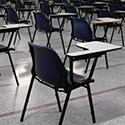June 2020
 Key Senate and House education committees held hearing in June focused on the impact of Covid-19 on U.S. schools and colleges and plans for re-opening them in the fall.
Key Senate and House education committees held hearing in June focused on the impact of Covid-19 on U.S. schools and colleges and plans for re-opening them in the fall.
The Senate Health, Education, Labor, and Pensions (HELP) Committee held a hearing on June 4, focused on “Going Back to College Safely.” Witnesses included Mitch Daniels, president of Purdue University; Christina Paxson, president of Brown University; Logan Hampton, president of Lane College; and Georges Benjamin, executive director of the American Public Health Association.
In opening statements, HELP Chair Lamar Alexander (R-TN) stressed that increased testing for the Covid-19 virus is necessary, that the federal government should not dictate whether postsecondary institutions should remain closed or be forced to open. HELP Ranking Member Patty Murray (D-WA) stressed the need for guidance in ensuring the safety of students, faculty, and workers returning campus. Paxson, in her opening statement, emphasized needs for supplemental funding for research.
A second HELP hearing on June 11, “Going Back to School Safely,” included discussion on reopening K–12 schools. Witnesses included Penny Schwinn, commissioner of the Tennessee Department of Education; Matthew Blomstedt, commissioner of the Nebraska Department of Education; Susana Cordova, superintendent of Denver Public Schools; and John B. King, Jr., president and chief executive officer of The Education Trust. Much of the hearing focused on considerations for reopening schools based on local conditions; potential challenges with available space in K–12 schools; and the impact of lost revenue on decisions on how to reopen schools.
The House Education and Labor Committee held a hearing on June 17, “Budget Costs and Lost Learning: Assessing the Impact of COVID-19 on Public Education.” Witnesses included Michael Leachman, vice president for state fiscal policy, Center on Budget and Policy Priorities; Rebecca Pringle, vice president of the National Education Association; Mark Johnson, superintendent of the North Carolina Department of Public Instruction; and Eric Gordon, chief executive officer of the Cleveland Metropolitan School District.
Committee members sought information on the needs that schools, teachers, and students will have in the upcoming academic year for incorporating distance learning as part of hybrid physical and virtual education, additional costs to account for changes to transportation and school infrastructure, and disparities in internet and device access for low-income students. Rep. Donna Shalala (D-FL) highlighted the need for accurate and reliable data to shed a light on the gaps in distance learning and tracking attendance in order to engage with students and their families who have not attended virtual classrooms.
As Congress continues to address the public health and economic impact of the Covid-19 pandemic, markups on the FY 2021 appropriations legislation are set to begin. In the House, the appropriations committee has plans to mark up all 12 FY 2021 bills during the weeks of July 6 and 13. The Senate Labor, Health and Human Services, Education (LHHS) subcommittee is scheduled to hold a markup of its bill on July 7, and the Commerce, Justice, Science (CJS) subcommittee is scheduled to mark up its bill on July 8.
The full House Appropriations Committee is expected to hold markup hearings on those two bills during the week of July 13. In the Senate, initial plans to begin FY 2021 bill markup during the week of June 29 were thwarted once Senate Democrats began to push to include Covid-19 aid and address police brutality in the appropriations process.